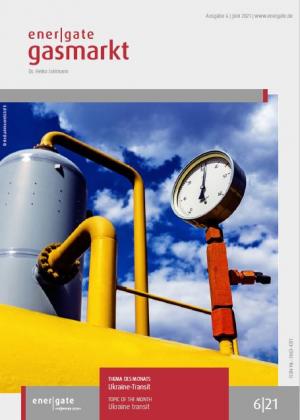TOPIC OF THE MONTH Ukraine transit
Since the beginning of January, gas traders and analysts have been watching Ukraine gas transit closely (ener|gate Gasmarkt 03/21). In some days in February, the flows through the Ukrainian- Slovakian border point Velke Kapuzany were extremely low. In March, volumes recovered. Since then, they have increased slightly month by month, and have usually been very stable over the course of each month. Nevertheless, they are still well below the 2020 level.
Not only Russian flows are low, supply is tight in general. On the other hand, temperature-related demand and potential demand for the refilling of storage facilities is high. As a consequence, Ukraine transit flows as well as the booking and non-booking of transit capacity repeatedly trigger nervousness among traders and analysts, resulting in roller-coaster prices. The situation between April 23 and 27 was almost absurd.
Market developmentbmp greengas: Interview with the managing director Matthias Kerner
ener|gate Gasmarkt repeatedly reported about the improving market position for biogas and biomethane. The legal framework improved slightly after amendments of the Renewable Energy Act (EEG) and the energy in buildings Act (EEG). The twists and turns the law-making process took were reported more than once in this publication. Furthermore, the transposition of the European Renewable Energy Directive II (RED II) into German law by the German Act on the Further Development of the Greenhouse Gas Reduction Quota will further improve the framework conditions for biogas and biomethane. This, too, was not clear after the first draft was circulating.
bmp greengas is one of the market leaders in German biomethane trading. Matthias Kerner, the managing director, already shared his optimistic outlook in an ener|gate Gasmarkt interview in February 2020 (ener|gate Gasmarkt 03/20). The development since last year was in line with his expectations, as he reports in the interview in this edition. bmp greengas sees a new dynamic especially in the heavy-duty transportation segment. In the meantime, bmp greengas sees such good potential in heavy-duty transport that it will build a plant for the liquefaction of biomethane together with the parent company Erdgas Südwest and the filling station operator for alternative fuels Alternoil. The new plant will have a capacity of 35,000 tons of LNG (around 48 million m3). The start of operation is scheduled for the end of 2022. The EnBW subsidiary Erdgas Südwest already worked in 2018 and 2019 on a similar project that was postponed mid-2019. Mr Kerner explains in the interview why the partners are now convinced that such a project is economically viable.



